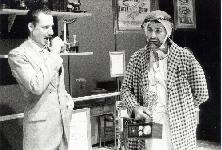SEARCH CurtainUp
Letters to Editor
REVIEWS
FEATURES
ADDRESS BOOKS
Broadway
Off-Broadway
DC
NEWS (Etcetera)
BOOKS and CDs
(with Amazon search)
OTHER PLACES
Berkshires
DC (Washington)
London
Los Angeles
QUOTES
FILM
LINKS
MISCELLANEOUS
Free Updates
Masthead
Type too small?
NYC Weather
A CurtainUp Review: The Perpetual Patient
by Les GutmanWe have met the enema and he is us.
---Keith Reddin

|
In the UK (and to a lesser extent in the US), the room in which doctors perform operations is known as a "theatre". Although I am not inclined to study the etymology of this use of the word, I'd hazard a guess that Moliere was not the first person to suggest that there are similarities between what actors do and what doctors do. But the line between theater and medicine has never been so fine as in Moliere's The Imaginary Invalid. Doctors are portrayed as dangerous, money-grubbing quacks who don the costumes and mouth the words of what they call a profession. (Moliere seemingly paid a heavy price for articulating this notion: he died shortly after appearing in the play's fourth performance.)
Keith Reddin's adaptation (the title change is more severe than any shifts in substance) brings the story of the hypochondriacal Argan (David Thornton) forward to the early 20th Century, and from France to America. This new setting reveals a treasure trove of newfangled medical remedies and cures that are, alas, no more legitimate than those urged by Moliere's 17th Century physicians. It's an inspired perch from which Reddin, in his typical style and hopefully without ill effect, casts long shadows.
Argan's infatuation with the catalog of 27 illnesses with which he is said to suffer is an expensive proposition. It's for this reason that he plans to have his lovely daughter Angelique (Nile Lanning) marry Thomas (Marc Ardito), the preposterously inept nephew of Dr. Purge (Matthew Sussman), his enemist extraordinaire. Angelique, however, is in love with Cleatis (Matthew Newton), a young man appealing in every way except that he is not a doctor. Angelique's cause is taken up by Argan's cantankerous parlor maid, Bridget (Leslie Lyles), and later, Argan's brother, Bernard (Ean Sheehy).
Argan's wife, Beline (Anna Thomson), has a slightly different agenda, although her husband is blind to it. In cahoots (both strategically and romantically) with Clutter (Tom O'Brien), a dishonest lawyer -- Reddin doesn't spare that profession either, she's angling to have Angelique (her step-daughter) shipped off to a convent while Clutter rewrites Argan's will to leave most everything to him. Without delving any further into the rich fabric Reddin (by way of Moliere) has woven, suffice it to say the good people all end up smiling.
Reddin has succeeded in embellishing the original play with a new context, without sacrificing anything of significance. The insolent Bridget (Moliere loved disrespectful servants: compare Dorine in Tartuffe) is here wrapped to great comic effect in the flag of the proletariat. The play's prologue and the interludes between acts, which Moliere had filled with largely irrelevant music and dance, Reddin has reconstituted as hysterical pitches for the various elixirs and appliances thrust upon Argan by his doctors. (Advertisements for these products adorn the wall of Jason Kirchner's very nicely configured set.) Comic references, some anachronisms, others not, abound. Billy Hopkins's sure-footed direction conspires in all of this brazenly, giving us all sorts of pleasant surprises, including references as diverse as Ionesco's The Chairs and Ludlam's The Mystery of Irma Vep.
Hopkins also provides ample evidence of the virtues of having the casting business as your day job if you're going to be an off-off Broadway director by night. Here he has assembled an especially fine group of performers, some familiar to theater audiences and others, like the magnificently frail David Thornton, who are better known for their work on film. Thornton's Argan makes the enjoyment of poor health as much a fine art form as a competitive sport. As his foil, Leslie Lyles is delicious, quickly gaining and keeping the audience's direct attention, and spicing scenes with a mx of comic hyperbole and genuine compassion. (I was less enthralled with her final act performance in disguise, which seemed perfunctorily done.) Of the remainder of the cast, the most interesting was Nile Lanning, who brought an entertaining deadpan inflection, as well as the usual sweetness, to the mostly flabbergasted Angelique.
There was a sense that the show was less carefully honed toward the end, especially in contrast to the fastidious attention to detail with which it began. I was also quite disappointed by the finale, which fizzled into a rather simple song the words of which were hard to discern -- instead of the more traditional ending consisting of a faux Latin convocation. These quibbles take away little from an otherwise most enjoyable and intelligent evening.
LINKS TO OTHER SHOWS MENTIONED ABOVE
Tartuffe . . .The Chairs . . .The Mystery of Irma Vep
LINKS TO OTHER PLAYS BY KEITH REDDIN
Black Snow . . .Brutality of Fact
| THE PERPETUAL PATIENT
by Keith Reddin adapted from Moliere's The Imaginary Invalid Directed by Billy Hopkins with Marc Ardito, Linda Alaska, Nile Lanning, Leslie Lyles, Matthew Newton, Tom O'Brien, Ean Sheehy, Matthew Sussman, Anna Thomson and David Thornton Set Design: Jason Krishna Costume Design: Sarah Edwards Lighting Design: Matte Stannic Original Songs by Jeffrey Linden and Art Permian Running time: 1 hour, 40 minutes with 1 intermission New York Performance Works, 128 Chambers Street (West Broadway) (212) 566-1500 Opened August 2, 2000 Closes August 12, 2000 Reviewed by Les Gutman 8/3/2000 based on a 7/31/2000 performance. |
